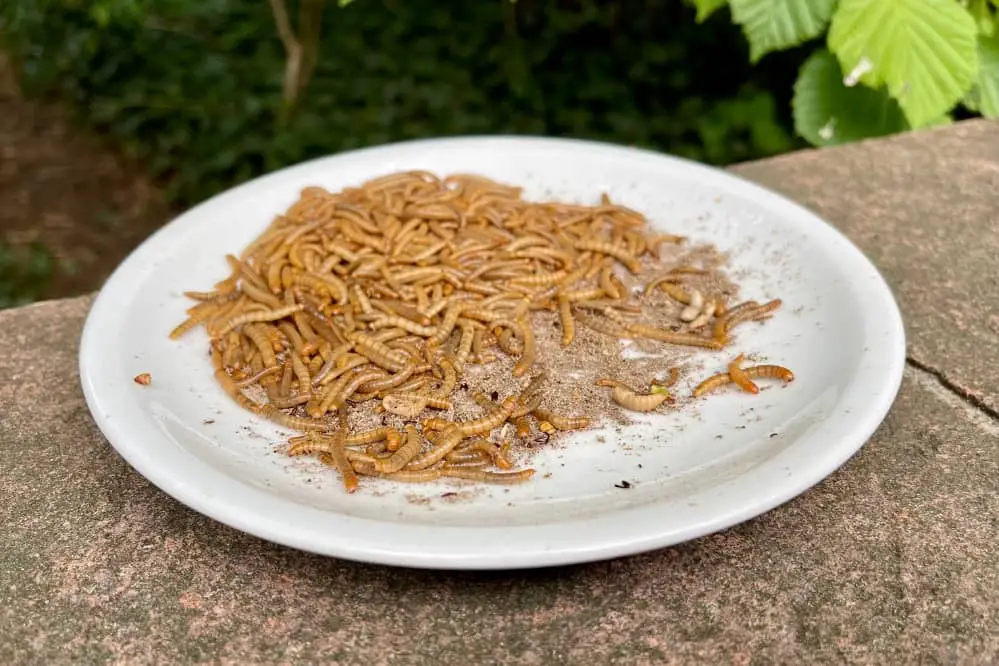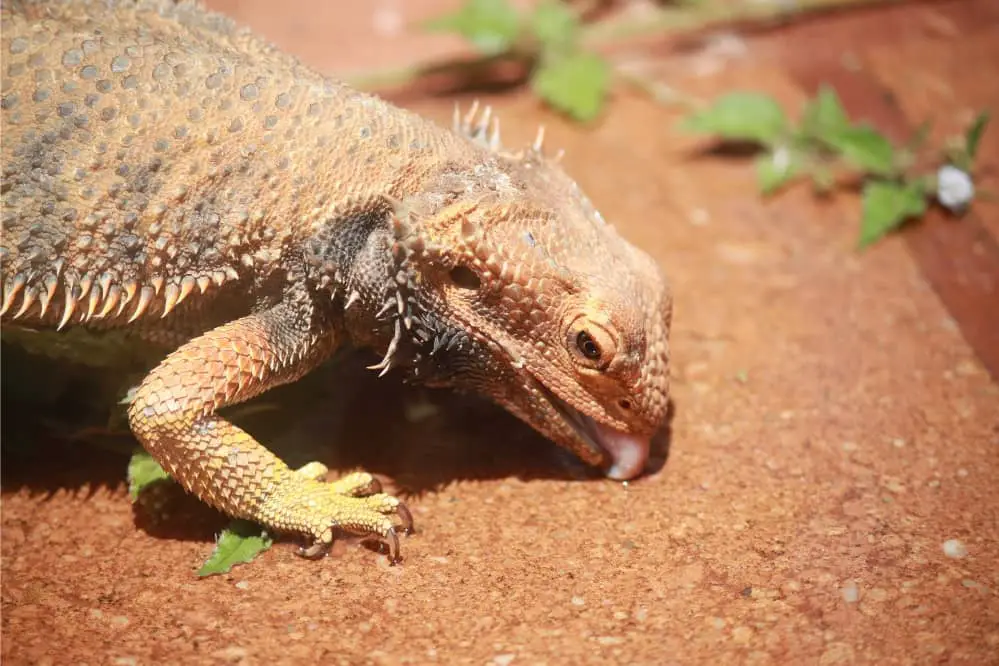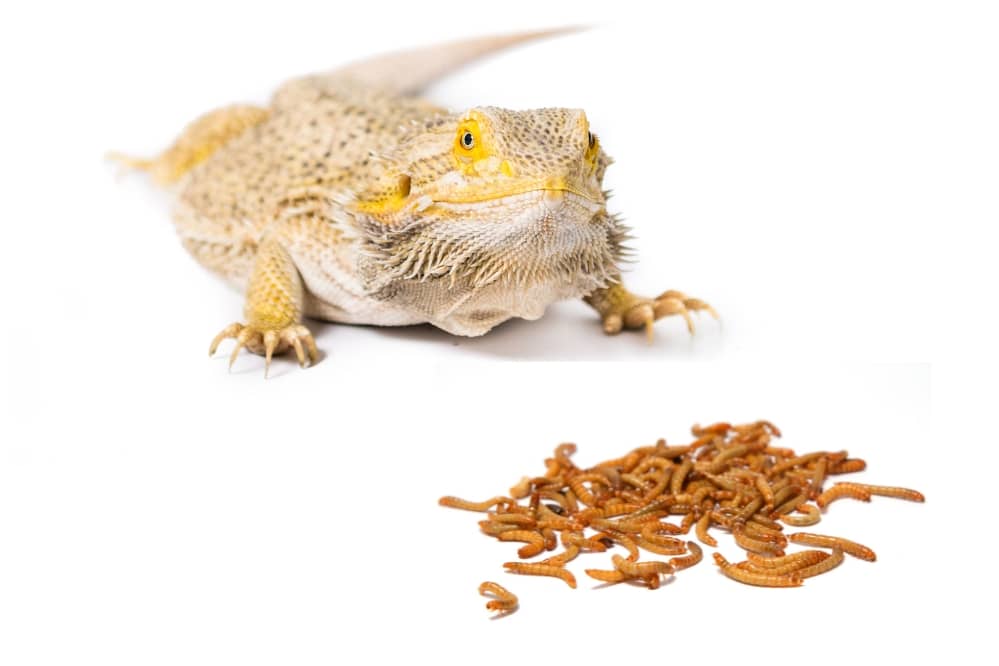Insects are an essential part of a bearded dragon’s diet, and beardies can eat a variety of insects like crickets, dubia roaches, earthworms, mealworms, silkworms,cockroaches, etc. As far as the question “Can I feed my bearded dragon mealworms every day?” is concerned, the simple answer is “No.” It is usually not recommended that you provide mealworms to your bearded pet on a daily basis. Although these insects are a good source of protein when combined with leafy greens, you should look for alternatives such as Dubia roaches and crickets and feed them alternatively.
A diet of five or six mealworms per week is recommended for an adult bearded dragon, but younger reptiles can get by on one or two mealworms each week. This small number should help your bearded dragon build strong bones, have fewer digestive problems, and live a long, happy life.
What Is The Appropriate Amount Of Mealworms For A Bearded Dragon?
Beardies require these insects for a balanced and nutritious diet. The answer to this question depends on the bearded dragons’ ages. However, on average, you can give your beardies five to six mealworms per feeding. However, this number may vary based on the reptile’s size.
If you have bearded dragons that are still juveniles or young, you should feed them fewer mealworms and always pick the comparatively smaller ones. It is necessary to keep in mind that mealworms have an exoskeleton made up of chitin, and it is difficult for a bearded dragon to digest this external skeleton. This is why mealworms are not usually given to a baby or young bearded dragon unless they are five months old. Remember that hard foods can sometimes make bearded dragons sick. Therefore, feeding young or infant beardies mealworms can be detrimental.
Can I Give Dried Mealworms To My Bearded Dragon?
Dried mealworms are better than live mealworms in a number of ways. They have a longer shelf life, are generally cheaper, and are available in sufficient quantities. In contrast, mealworms that are still alive must be stored in the refrigerator so that they do not transform into beetles throughout their lifetime.
No matter if the worms dried out on their own or were frozen and dried, they do not require the same level of refrigeration. Therefore, it is safe to feed your beardie dried mealworms, but they have the same risks, so they should only be fed in small amounts and only to fully grown beardies.
How To Feed Mealworms To A Bearded Dragon

Step 1: First, Buy Live Mealworms
Mealworms are awesome because they can be purchased from most pet stores. They are also available online. You can choose from different sizes that fit beardies of different sizes and ages. You already know that small bearded dragons shouldn’t eat big pieces of food. They may suffocate or experience complications such as coughing and impaction if they do so.
You can keep the mealworms in storage if you want to. But make sure they aren’t dead before giving them to your bearded dragons. You should never give dead mealworms to your bearded dragon.
Step 2: Put Calcium Powder On The Mealworms
Before giving bearded dragons mealworms, it’s best to sprinkle them with calcium dust. This will help bearded dragons get the calcium their bones need. This is also a good idea if you think your reptile isn’t getting enough calcium through his diet and needs to eat more calcium to attain optimum bone growth and maintenance.
Bearded dragons need the right amount of calcium, so keep that in mind. The truth is that bearded dragons usually don’t get enough calcium, no matter how well-balanced their diet is. So it’s always a good idea to give them calcium supplements along with their food.
Step 3: Hand-Feed Your Animal
The best way to give bearded dragons mealworms is with your fingers. The bearded dragons would generally lick it in order to obtain the food. However, you should exercise caution when doing so. Beardies are not usually mean, but they can bite your fingers if they happen to.
Bearded dragons can also be fed by hand, which is a great way to get to know your pet. But if you are worried, you can keep your finger safe by using tweezers. The other way to feed mealworms is to use a bowl or plate. One or two worms can be put in a shallow bowl. Alternatively, you can put the worms on the plate to make it easy for the bearded dragons to get the food.
Do Mealworms Bite?
There is a myth that mealworms are very dangerous for reptiles because they have strong bites that can hurt a reptile pretty badly. Mealworms do have very powerful bites, but when they are held, they try to move away instead of biting. They bite sometimes, but they cannot hurt an adult bearded dragon. A bearded dragon will kill a mealworm quickly if it bites it, so you do not have to worry about that.
So Should You Stop Feeding Mealworms?

If your bearded dragon is healthy and not malnourished, there is no reason to give it mealworms as a food source.
Bearded dragons that are ill or malnourished can eat mealworms to put on weight as rapidly as possible. They are highly addictive and very quickly cause a bearded dragon to gain weight, which means that they can be of great assistance in this situation.
Relate article What are signs of sickness in bearded dragons?
Mealworms can be your best friend if you want to train your bearded dragon in any manner, as your bearded dragon won’t be able to resist a mealworm for very long. This is important to keep in mind if you wish to tame or train your bearded dragon in any way.
Conclusion
Though bearded dragons require insects in their diet regularly, it’s necessary to choose the right type of insects for your bearded friend according to his age and size. As far as mealworms are concerned, aside from this benefit (high protein level and energy source), giving mealworms to your bearded dragon is not a particularly healthy practice. Feeding mealworms to baby and young beardies up to 5 months of age is prohibited, while adult beardies are allowed to eat in small quantities occasionally. This is so because mealworms are high in fat (that can cause obesity) and have an exoskeleton (that is difficult for beardies to digest).
So, instead of always feeding mealworms, you should try feeding your bearded dragon dubia roaches and greens. These will provide more nutrition for your bearded dragon than mealworms will.

